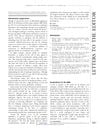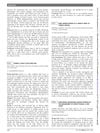
Not having the gene PLAAT3 leads to fat loss, high insulin resistance, and abnormal fat levels in the blood due to a disruption in fat cell development and function.
September 2016 in “Journal of dermatological science” The conclusion is that the variation in hair thinness in patients is mostly due to the amount of underdeveloped hairs, and treatments that thicken fine hairs might work for those with mild to severe conditions.
 1 citations,
April 2016 in “Journal of The American Academy of Dermatology”
1 citations,
April 2016 in “Journal of The American Academy of Dermatology” Blood pressure medications may increase the risk of skin cancer.
 May 2021 in “The FASEB Journal”
May 2021 in “The FASEB Journal” The research gives new understanding on how human steroid 5α-reductases work and how drugs like finasteride inhibit them, which could help in creating new drugs.
 October 2000 in “Annals of Dermatology”
October 2000 in “Annals of Dermatology” Finasteride effectively treats hair loss in men with minimal side effects.
 36 citations,
June 2014 in “Experimental Neurology”
36 citations,
June 2014 in “Experimental Neurology” Teriflunomide is an effective and generally safe oral treatment for relapsing MS, reducing relapses and slowing disability progression.
1 citations,
March 2021 in “F1000Research” Plant-based compounds might be effective, low-side-effect treatments for prostate cancer by blocking a specific enzyme.
7 citations,
December 2011 in “InTech eBooks” Glucocorticoid and mineralocorticoid therapy effectively manage Congenital Adrenal Hyperplasia symptoms but have limitations.
 December 2022 in “Research Square (Research Square)”
December 2022 in “Research Square (Research Square)” Isotretinoin treatment increases p53 levels in the skin, which may explain its effectiveness against acne.
21 citations,
August 2017 in “Journal of veterinary internal medicine” Combining amino acid and stem cell therapy may help manage hepatocutaneous syndrome in dogs.
10 citations,
November 2017 in “Letters in drug design & discovery” Researchers identified promising inhibitors for the BRD4 protein, including finasteride and amentoflavone.
25 citations,
June 2017 in “Neuropharmacology” Increasing TSPO in the brain reduces anxiety and depression.
13 citations,
April 2019 in “International journal of molecular sciences” Acyzol could help treat conditions caused by zinc deficiency.
 May 2023 in “The journal of investigative dermatology/Journal of investigative dermatology”
May 2023 in “The journal of investigative dermatology/Journal of investigative dermatology” A potential treatment for atopic dermatitis could be to increase PADI1 expression to improve skin barrier function.
 23 citations,
June 2014 in “Journal of Pharmaceutical Sciences”
23 citations,
June 2014 in “Journal of Pharmaceutical Sciences” Finasteride cream helps hair growth with less side effects.
 46 citations,
January 2010 in “The journal of investigative dermatology/Journal of investigative dermatology”
46 citations,
January 2010 in “The journal of investigative dermatology/Journal of investigative dermatology” Mice lacking Insig proteins had hair growth problems due to cholesterol buildup, but this was fixed by the drug simvastatin.
 1 citations,
January 2020 in “Archives of Medical Research”
1 citations,
January 2020 in “Archives of Medical Research” Formononetin, found in red clover, may treat hair loss with fewer side effects.
Polyglutamic acid is a valuable, sustainable ingredient for skincare and haircare products.
 47 citations,
December 2000 in “Archives of Dermatological Research”
47 citations,
December 2000 in “Archives of Dermatological Research” Androgens significantly affect female hair loss, and hormonal treatments may help.
 December 2000 in “Journal of the Royal Society of Medicine”
December 2000 in “Journal of the Royal Society of Medicine” Antiandrogen therapy may help treat hidradenitis suppurativa.
 3 citations,
December 2000 in “Journal of the Royal Society of Medicine”
3 citations,
December 2000 in “Journal of the Royal Society of Medicine” Antiandrogen therapy may be beneficial for women with hidradenitis suppurativa.
 2 citations,
March 2020 in “PubMed”
2 citations,
March 2020 in “PubMed” Biotin deficiency is not a major cause of Telogen Effluvium hair loss.
 65 citations,
April 2002 in “Journal of Alternative and Complementary Medicine”
65 citations,
April 2002 in “Journal of Alternative and Complementary Medicine” Plant extracts effectively reduce hair loss and increase growth, offering a safe alternative treatment.
 68 citations,
April 2002 in “Journal of Alternative and Complementary Medicine”
68 citations,
April 2002 in “Journal of Alternative and Complementary Medicine” Natural 5AR inhibitors effectively improve mild to moderate hair loss in men.
3 citations,
May 2022 in “Clinical endocrinology” Hair steroid measurement is an effective method to diagnose and monitor CAH in developing countries.
 47 citations,
January 2019 in “Nature communications”
47 citations,
January 2019 in “Nature communications” Polyamines help fix DNA damage accurately in cells.
 April 2022 in “Diabetes Therapy”
April 2022 in “Diabetes Therapy” Low testosterone does not prevent prostate cancer in men with type 1 diabetes.
 43 citations,
August 2010 in “Expert Opinion on Investigational Drugs”
43 citations,
August 2010 in “Expert Opinion on Investigational Drugs” Inhibitors of 11β-HSD1 show potential for treating type 2 diabetes but require more testing for safety and effectiveness.
 165 citations,
February 2014 in “Phytotherapy Research”
165 citations,
February 2014 in “Phytotherapy Research” Myrtle has various health benefits and potential for medicine development.

Kerion is a rare but serious scalp infection that needs proper treatment.




















